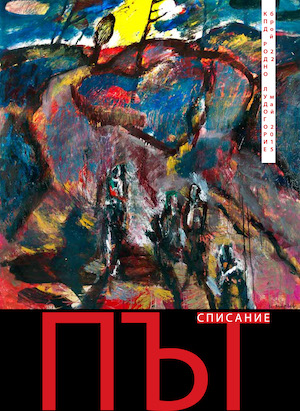

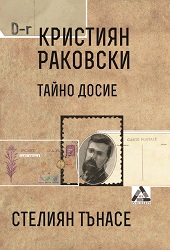
Keywords: Christian Rakovski file; Christian Rakovski; Stelian Tanase; archives; Secret file;
This book contains the official documents gathered by Stelian Tanase and related to the activity of Christian Rakovski in Romania. Rakovski took major part in the Communism movement in the beginning of the century. After that, in 1917, he went to Russia, where he was killed by Stalin.
More...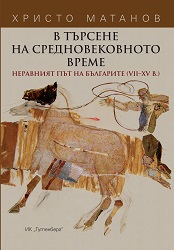
Keywords: Medieval Bulgarian history; History; Byzantium; Ottoman Balkans History; History; Bulgarian History; Balkan History
In the book "Seeking the Middle Ages" Prof. Hristo Matanov is presenting the rich and dramatic history of the Balkan region through the Bulgarian history and culture. In this study Prof. Matanov shows the location of Bulgaria not only as crossing point of the ancient trade routes between Europe and Asia, but as a crossing point of politic interests and cultural transfer. This has brought the necessity to withstand the pressure that was coming from North-West, North-East and from the South and has played a significant role in the rises and the downfalls of the Bulgarian kingdom. The author's contribution for the book is that he has written this solid history in such way, that it may be read, understood and appreciated by both academic readers and common readers, who are interested in history. The author gathers in one book the entire Medieval history of Bulgaria, the foundation of the kingdom, the complex Politics, in which the Bulgarian rulers had to go in to in order to protect their kingdom and subjects, the religious shift of the kingdom to Christianity from paganism and the periods when it was conquered by Byzantium and later - by the Ottoman empire.
More...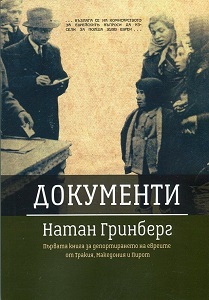
Keywords: Jewish history;World War 2;Deportation of Jews;Bulgarian Jews;Holocaust;
This book was rejected for almost seventy years. First published in 1945, it was suppressed immediately. After 1945, it was neither republished nor studied; for decades, it was not even cited in Bulgaria. Almost nothing was known about it's author; tracking him down turned out to be an inexplicably difficult task. Anonymity and oblivion - that was the price of his work which first described the deportation of Jews from Thrace, Macedonia and Pirot. A story that would become one of the biggest taboos in Bulgarian history for at least half a century. The author passed away in the late 1980's, never living to see his name in it's rightful place: among the first researchers to reveal the unthinkable history of the Holocaust.
More...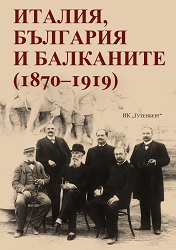
Keywords: Italia; Bulgaria; Balkans; history; Balkan history;
The articles in this academic corpus are extended versions of the reports that were presented for the Bulgarian-Italian academic workshop "Italia, Bulgaria and the Balkans (1870-1919)" on September 23-24th in year 2011 and hosted by the Institute for Balkan Studies and Centre of Thracology and part of the Bulgarian Academic of Science. The content of the articles varies between historical, social, cultural, political, architectural and other intersections between the two countries.
More...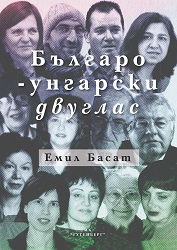
Keywords: Translation;Interviews;Bulgarian translators;Hungarian translators;Intercultural relations
This book contains the collected interviews that Emil Basat took from the translators Tosho Donchev, Svetla Kyoseva, Gabriela Hadzhikostova, Chavdar Dobrev, Yulia Dimitrova, Ivanka Pavlova, Yonka Naydenova, Stefka Hrusanova, Yulia Krumova, Martin Hristov, Nikolay Boykov, Neli Dimova. This is a book about the acquaintances of Bulgaria and Hungary, best shown in the point of view of and through the voices of the translators, who translate Bulgarian literature in Hungarian, and the translators, who translate Hungarian literature in Bulgarian. The book is called "voices" because it unites the voices of the translators from the two countries showing in this manner that they have surpassed the mere translation of literature, but are trying to make their native culture popular in another country by surpassing this "otherness".
More...
Keywords: investigative journalism;investigative reporting;documentary;Bulgarian Politics,
“Kill the Wanderer” is a documentary investigation into one of the most emblematic crimes of the Cold War – the murder of the Bulgarian dissident writer, Georgi Markov, in London in 1978. Throughout the whole world this case acquired infamy as the “Bulgarian umbrella” murder. The assassination became an emblematic example of “wet operations” involving the secret services of the former Eastern Bloc. It recently became the subject of commentary in the media throughout the world after the death of the former Russian intelligence officer from the Federal Security Service and political émigré, Alexander Litvinenko at the end of 2006 in London, due to many of the similarities between the two cases. Although 29 years have passed since the murder and Scotland Yard still has not discovered the perpetrator, the leading opinion in the West is that the murder of the Bulgarian dissident was carried out by the Bulgarian Security Services on the orders of the then head of state in Bulgaria, Todor Zhivkov, with the assistance of the KGB. “Kill the Wanderer” for the first time calls upon specific archive materials to confirm this thesis. Hristo Hristov (1967) is one of the best investigative journalists in Bulgaria and has researched the crimes of the communist regime. He has published documentary books on the murders in the communist camps in Bulgaria (1944–1962) and on the kidnapping of the Bulgarian émigré, Boris Arsov by the Bulgarian State Security Services from Denmark in 1974. Work on the “Kill the Wanderer” took him six years (1999–2005) and as a court reporter he has reported on the Markov murder case since 1991. His book is based on a number of documents hitherto unknown, many of which are from the secret archives of the former State Security Services.
More...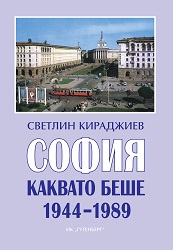
Keywords: Sofia; history; World War 2; city development; local geography; geography; capitals;
This book presents the city of Sofia from the second half of the 20th century. This period is marked not only by the end of World War 2 but by the change of political power in Bulgaria. Through this book, the author intends to give more information about moments of the development of the capital, it's it's influence over material and spiritual culture and he relates all of this to the citizens of Sofia in the reviewed decades. Sofia is very old city, although it's citizens don't realize it, but its modernization and geographical growth begun after the Liberation of Bulgaria in 1878. After 1944 Sofia has shown rapid development and population growth - for 300 000 to over 1 million citizens for a period lasting over 40 years. The houses have been replaced by modern buildings, the city districts have been expanded, the city has turned into a center of industry and slowly, but steady, Sofia has turned for average Balkan city to a capital with European influence.
More...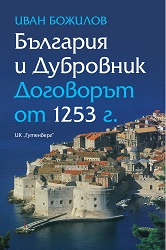
Keywords: Bulgaria; Dubrovnik; Medieval Bulgarian history; Ragusa; Diplomacy; History;treaties; treaty; Balcan history; thirteenth century;
Dubrovnik is the dream city of the researchers, not only for its rich history, but for its beauty as well - the vast wall and strong towers, that ignite pictures from the past. The historic school of Dubrovnik is evident not only in his castle-like view but also when one takes notice of the rich resources in the archives of the city. This book was written thanks to these resources. Due to the historical events, the Bulgarian historiography resources are poor or missing and the Bulgarian historians are able to gather only fragments from it and the diplomatic and cultural condition of Medieval Bulgaria thanks to the archives of other countries and kingdoms, that Bulgaria had diplomatic or political connections with. This book main topic is the treaty from 1253 when the government of Michael II Asen concluded a commercial and military treaty with the Republic of Ragusa (a.k.a. Dubrovnik) and the other historical evidences that have been found in the rich archives of Dubrovnik.
More...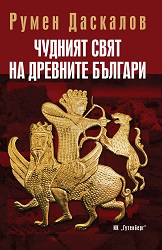
Keywords: Proto-Bulgarian history; Bulgarian history; history; Balkan history; local history; Period of Nation Building; Medieval Bulgarian history; Medieval history
This is a book about the history and the origin of the Proto-Bulgarians and their way to the Balkans and it follows the concept for modern Proto-Bulgarian history. What can be called "modern" is the fact, that the sources on which this book is based are rather different from the well known and traditionally used Latin and Byzantine authors, but among the reviewed sources are Chinese, Indian, Arab, Armenian and other texts of different types ans genres. The author Rumen Daskalov is giving his own interpretations and the purpose of his analysis is to emphasize, summarize and promote the best accomplishments of the Bulgarian school of Proto-Bulgarian history.
More...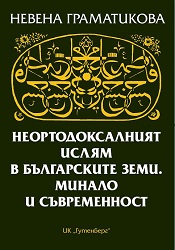
Keywords: Unorthodox Islam; Islam; Bulgaria; Balkan Islam;
This book is among the few deep analysis on Islam in the Bulgarian lands, written by a Bulgarian author. The analysis covers the origin of Islam in the Bulgarian lands, it's spreading there and its relation to cult objects according to the Life of Demir Baba and Otman Baba. Studies, like this one, are very important for the polemic and uncertain times we live in, because they can help us understand better the culture of part of the population of our countries. We are witnessing conflicts on ethnic basis, caused by misunderstanding or disinformation on processes that were being formed for centuries. Understanding this culture is important not only to ourselves but to the person standing next to us, for respecting each other, despite of the religious differences. In this book the author made serious attempt to give an answer to a polemic academic topics related to the Alevi(Alevism), like their origin, their destiny and the parallels of their historical and cultural memory in the present.
More...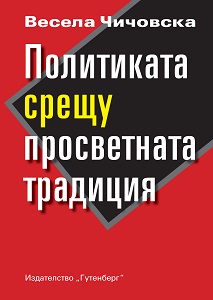
Keywords: Bulgarian history; History of education; Socialism;
This book is about the regime after 9th of September 1944 (The Socialist Revolution of 9th of September) and the unopposed choices taken in the sphere of education by the government of Kimon Georgiev, unopposed because there had been no political opposition left in the government. Then, during the 6th Grand National Assembly a great number of time-tested and aprooved educational institutions were closed legally, as it looked like, and ideological principles (Politics) were brought in the educational system of Bulgaria. For the creation of this monograph, the author Vesela Chichovska had reviewed the collections of Central State Archives of Bulgaria, the archive of several Ministries, the archives of Bulgarian Academy of Science, the diaries of the 26th Ordinary National Assembly and of the 6th Grand National Assembly, forming solid, but almost unused, except from her documentary material.
More...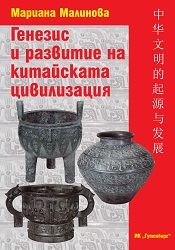
Keywords: Research; Chinese history; Chinese situating; Development of nations;
Chinese civilization is one of the five great nations that were evident in the ancient human history. Even today Chinese civilization is perceived and described in the academic literature as a civilization that is creating, developing and administering the ideology (religio-philosophical) and the cultural orientation of their neighbor countries. The forming of the cultural areal in East Asia has begun after the discovery of the Chinese hieroglyphs around 1000 years B.C. The author of this monograph is not repeating the known about the history of the Chinese civilization but she rather goes into a topic that is less explored. The chronological range of her research is from 3000 years B.C. to 8th century B.C.; from the end of Neolithic era to the first items made of iron. This book is among the first Bulgarian monographs on Asian topic. It is written by a scholar that speaks Chinese fluently, has diplomas from three Chinese universities and that had specialized Chinese archaeology, Old Chinese history and Old Chinese language. One of the biggest problems before the author and here work with the old texts has been the fact that she had to separate myths from history, because in the East traditionally from myths mark the beginning of history. In this book is reviewed the specific terminology in Chinese archaeology, especially the terminology from the Bronze era and the ancient Chinese bronze. In the book there are pictures of many Chinese archaeological items, or graphics of such with information about their physical characteristics and locations where they have been found. This academic work has contributed to the Bulgarian science society and more directly - to the Bulgarian Asian studies.
More...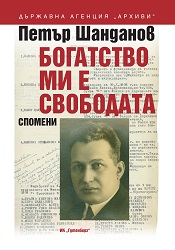
Keywords: Memoirs; Documentary; Bulgarian prose; Bulgaria; New Bulgarian Literature
The memories of Petar Shandov are authoritative source about the history of the movements of national-integration for the Bulgarians in Macedonia. During his long and active involvement in this movement Shandov had gathered rich and valuable information about its development, about the controversy and the struggles in it, about the changes of ideas and its evolving and about the figures of that historical period. The chronological range of the memories in this book is form 1908 to 1950. The memories are written in an understandable, enthralling way and are great contribution to the Bulgarian documentations.
More...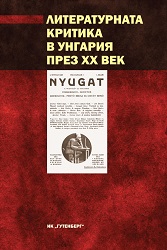
Keywords: essayism; literature field; Hungarian literature; Hungarian literary historiography; Twentieth century;
This book gives an opportunity for a different view of Hungarian essayism. Literature is always framed within a certain input language and the critics, except the translators, are the ones that are making certain title known in an output language. The essays in this book give a chance for everyone that is interested in Hungarian literature to receive new information and topics that sometimes show similarities in Bulgarian literature.
More...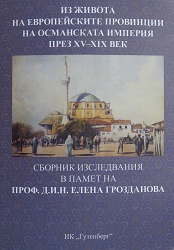
Keywords: Balkan history; Ottoman empire; Medieval and early modern history; Population; Hired Workers; Finance; Warfare; Religious struggles; Muslim literary tradition; multinational;
This collection of studies has been assembled by nineteen scholars, historians and linguists, who are part of leading Bulgarian and other countries research centers and universities. The studies and the articles in this collection are concerning different topics from social-economic, demographic, political, religious and cultural Balkan and Southeastern European history, including the Bulgarian territories from for the period 15th to 19th century. Many of these studies and articles concern researches made by Prof. Grozdanova. The main idea behind these studies is the scientific introduction, interpretation and presentation of new, unused or rarely used, sources - most of which originate from the Ottoman archives and other sources.
More...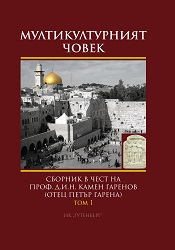
Keywords: collective works; collection; obituary; archaeology; history; literature; language; Balkan history; Balkan; South eastern Europe; Balkan history; Bulgarian literature;
This volume contains studies, articles and research reports dedicated to Prof. Petar Garenov and the 60-th anniversary of his death. In his life Prof. Garenov was part of the academic department of History and Archaeology of Povdiv University "Paisii Hilendarski". The title of the collection represents the person Prof. Garenov was - an outstanding theologian, Doctor of history, sculptor and painter, who received various awards in all these areas during his life. All the studies and articles in this volume cover a large area of topics and subjects in the spheres of History, Archaeology, Language and Literature. Some of the works contain illustrations and images used to support the arguments of a concrete author. All the Bulgarian and foreign authors of this edition are prominent scientists and experts in different scientific areas.
More...